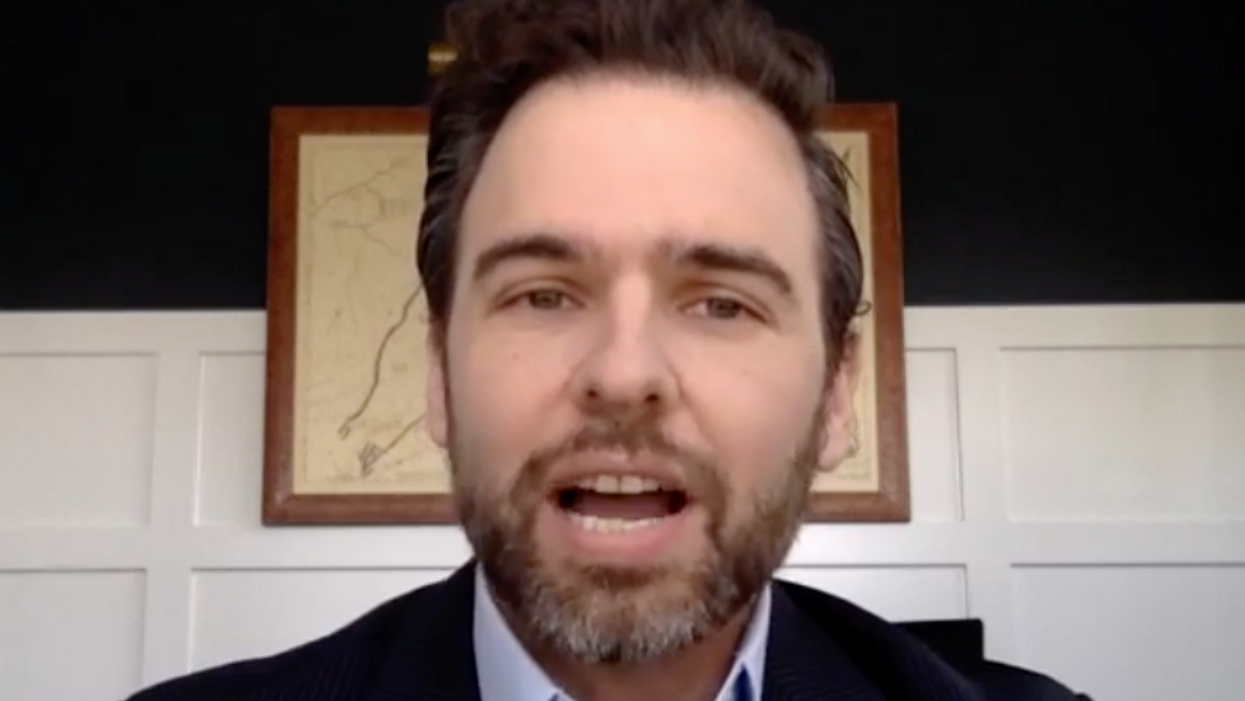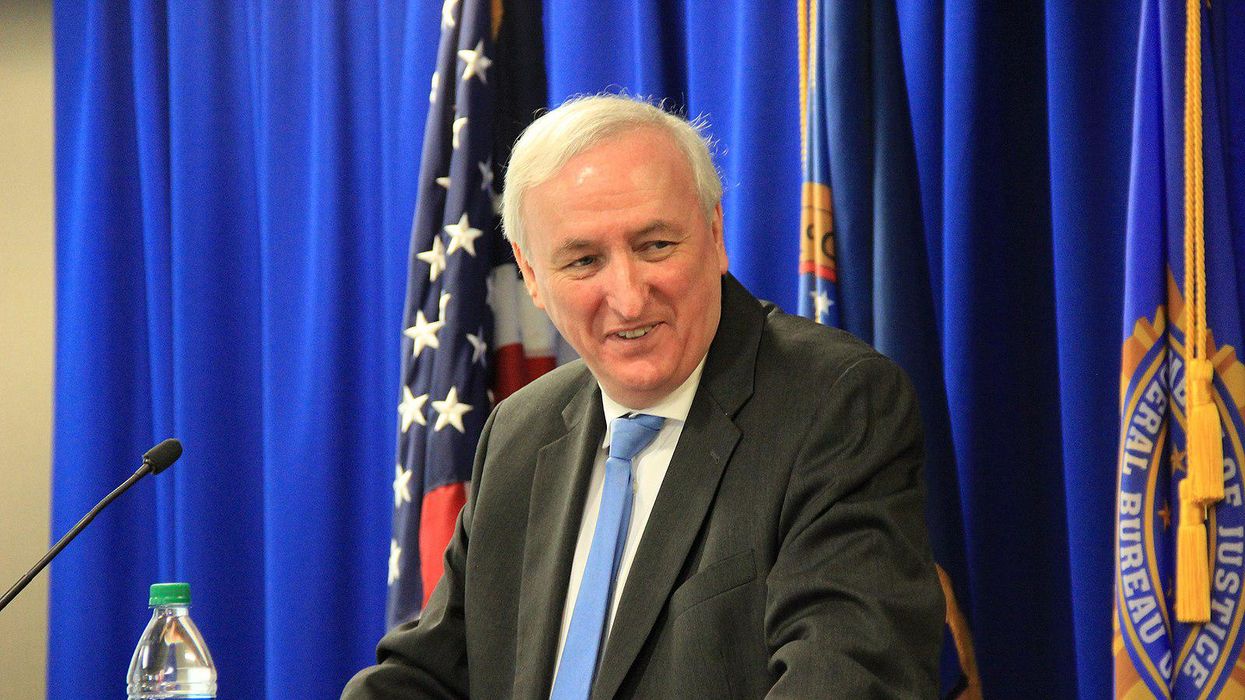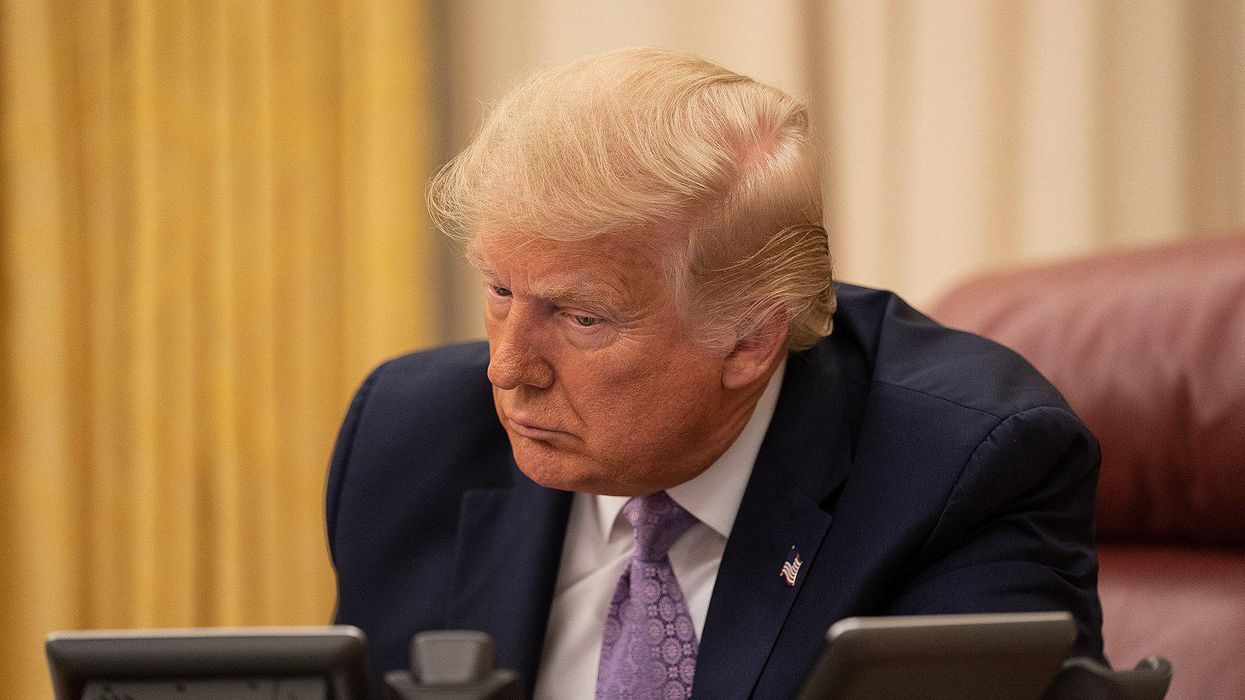Former White House Chief of Staff Mark Meadows may face "significant criminal exposure" for his prominent role in pressuring the Justice Department (DOJ) to overturn the free and fair 2020 election, according to a timeline published by Just Securityand a criminal complaint filed by Citizens for Responsibility and Ethics in Washington (CREW).
CREW filed their complaint against both Meadows and Trump last week, claiming the two violated a "criminal civil rights law" and "criminal provisions of the Hatch Act" in their attempt to effort to overturn the election.
"Government officials who try to subvert our republic and undermine democratic rule must be held accountable to the full extent of the criminal law," said CREW President Noah Bookbinder.
The Just Securitytimeline depicts those offenses in vivid detail.
Meadows And Giuliani
Throughout the course of the extraordinary effort to overturn the election Meadows worked with Trump's personal attorney Rudy Giuliani.
First contact reportedly started on or around November 12, 2020. According to Washington Post reporters Carol Leonnig and Philip Rucker's book I Alone Can Fix It, Giuliani asked Meadows to investigate claims that allege tens of thousands of "illegal aliens" may have voted in Arizona. Of course, this was debunked— in reality, it was U.S. citizens living abroad who voted legally.
Giuliani and Meadows also created a “parallel track" while Trump's campaign set up a team in Georgia -- a state Biden won despite its history of being a red state, according to Wall Street Journal reporter Michael Bender.
“A parallel track was underway from the Oval Office where Giuliani and Meadows, who was just returning to work after being sidelined by Covid, started bringing in their own people," writes Bender in his book Frankly, We Did Win This Election.
CREW alleges that in those first few weeks after the election Meadows, Giuliani, and other Trump aides “began a coordinated multi-state campaign to prevent states from counting legal ballots (or to throw out already- counted legal ballots)."
Not 'Sufficiently Loyal'
Meadows also played a significant role in the firing or discrediting of federal officials who pushed back against the administration's outlandish claims of voter fraud— Former Defense Secretary Mark Esper was the first to fall victim. On November 9, 2020, Meadows called Esper to say "the president's not happy… And we don't think you're sufficiently loyal. You're going to be replaced. He's going to announce it this afternoon," according to Leonnig and Rucker.
Lo and behold, four minutes later, Trump tweets: "I am pleased to announce that Christopher C. Miller, the highly respected Director of the National Counterterrorism Center (unanimously confirmed by the Senate), will be Acting Secretary of Defense, effective immediately."
In mid-November or December, Meadows introduced Trump to Jeffrey Clark, whom DOJ officials say “was putting together a secret plan to oust Rosen, the acting attorney general, and force Georgia to overturn its results," according to Bender's book. Meadows denies involvement. He also connected Trump and former North Carolina Supreme Court Justice Mark Martin, who came up with the theory that former Vice President Mike Pence could stop the certification of Biden, according to the New York Times.
Leonnig and Rucker's book quoted one senior official saying, Meadows facilitated the president's being "exposed to crazy people spouting lunatic theories about the election and his ability to overturn it. That is all Meadows."
'We're Going To Get The President There'
It was around this time that Meadows acknowledged to the White House Communications Director Alyssa Farah that he knows Trump lost the election.
"We need to give a graceful exit and acknowledge that Biden won," Farah tells Meadows.
"I know, I know," Meadows responded. "We're going to get the president there."
But not only could Meadows never "get the president there," according to Leonnig and Rucker, "There wasn't any indication that he had even tried."
In fact, it was mere days after this that Meadows expressed his displeasure with former Attorney General William Barr for telling the Associated Press, "to date, we have not seen fraud on a scale that could have effected a different outcome in the election."
Leonnig and Rucker report that Barr was surprised Meadows "hated" the news story.
"Meadows sat silently on the opposite side of the dining room, with his arms crossed, a posture that seemed to say, This is DOJ's problem," the two write.
Georgia
At this point, Meadows and Trump were laser focused on Georgia. On December 22, 2020, Meadows took a trip to observe an absentee ballot audit and met with Frances Watson, the lead elections investigator in the Georgia Secretary of State's office.
A day later, Trump gets on the phone with Watson, urging her to find "dishonesty" to overturn the election and says she will be "praised" for doing so, according to the Wall Street Journal. Trump also said it was Meadows who told him to contact her.
"Well you have a big fan in our great chief, right? Chief of staff, Mark," said Trump.
Shortly after this, Meadows "began a separate element of the pressure campaign on DOJ," telling acting Attorney General Rosen to focus on "wrongdoing" in Georgia, according to CREW's complaint.
On January 1, Meadows followed up on allegations "of signature match anomalies" in Fulton County, Georgia.
"Get [Assistant Attorney General] Jeffrey Clark to engage on this issue immediately," he wrote in an email to Rosen.
The next morning, Assistant Attorney General Clark confirmed to Rosen that he "spoke to the source and [was] on [a call] with the guy who took the video," adding that he was "[w]orking on it" and that there was "[m]ore due diligence to do."
"The pressure campaign appeared to have some immediate impact," says the complaint.
Hours later, Trump, Meadows, and other associates made the infamous phone call pressuring Georgia Secretary of State Brad Raffensperger to overturn the election
Section 241
In their complaint, CREW first alleges that Trump and Meadows committed civil rights violations, specifically breaking Conspiracy against rights, or Section 241.
Section 241 makes it illegal for two or more persons to "conspire to injure, oppress, threaten, or intimidate any person in any State, Territory, Commonwealth, Possession, or District in the free exercise or enjoyment of any right or privilege secured to him by the Constitution or laws of the United States."
"The right to vote for federal offices and the right to have one's vote fairly counted are among the rights secured by Article I, Sections 2 and 4, of the Constitution, and hence protected by Section 241," reads the complaint.
They violated Section 241 by:
Conducting a coordinated campaign to prevent states from counting legal ballots.
Firing or publicly discrediting federal officials who refuted the narrative of purported voter fraud and a stolen election.
Threatening and attempting to intimidate state officials, including Georgia Secretary of State Raffensperger, to take steps to overturn the results of the election in their states.
Pressuring DOJ officials to file the lawsuit in the Supreme Court that, if successful, would have overturned the election results in Arizona, Georgia, Michigan, Nevada, Pennsylvania, and Wisconsin.
Pressuring Attorney General Barr and Acting Attorney General Rosen to use DOJ resources to help investigate false allegations of fraud in Michigan and Georgia.
Attempting to fire Acting Attorney General Rosen for refusing to direct the DOJ to support the election fraud claims.
"The ultimate object of the conspiracy was to deprive citizens of their constitutional rights by changing the legal result of the 2020 election," states the complaint.
Hatch Act
The Hatch Act protects federal funds, employees, and programs from political manipulation, according to the CREW.
The complaint notes that criminal prosecutions under the Hatch Act are rare, but not unprecedented. CREW believes that the "egregious" conduct of Trump and Meadows warrants charges under Coercion of political activity – 18 U.S.C. § 610 and Interference in Election by Employees of Federal or State Governments – 18 U.S.C. § 595.
Violations of 18 U.S.C. § 610:
President Trump's verbal abuse of Attorney General Barr for publicly renouncing his election fraud allegations as meritless, causing him to resign, firing CISA Director Krebs, and causing U.S. Attorney Pak to resign, all of which sent the message to others to pursue the allegations or get out.
President Trump's pressure on DOJ officials, including Acting Attorney General Rosen, to support lawsuits seeking to overturn his election loss and to appoint a special counsel to investigate Dominion Voting Systems.
President Trump's pressure on DOJ officials to file the Supreme Court complaint that sought to throw out election results in six states.
Using Mr. Olsen to further apply pressure on Acting Attorney General Rosen and DOJ officials to file the Supreme Court lawsuit through repeated emails and phone calls.
Mr. Meadows' pressure on DOJ officials to investigate various dubious claims of voter fraud in Georgia and elsewhere, including through multiple emails sent to Mr. Rosen.
President Trump's attempt to fire Acting Attorney General Rosen and replace him with Assistant Attorney General Clark, including at the January 3 "high- stakes meeting" at the White House.
President Trump's pressure to fire U.S. Attorney Pak, which resulted in his resignation.
They broke 18 U.S.C. § 595 by:
President Trump's use of his official authority as President to verbally abuse Attorney General Barr, causing him to resign, fire CISA Director Krebs, and cause U.S. Attorney Pak to resign, all for not having more vigorously pursued or supported President Trump's meritless claims of election fraud.
President Trump's use of his official authority as President to pressure Acting Attorney General Rosen to pursue meritless election fraud claims and baseless lawsuits in a White House meeting.
President Trump's use of his White House personal assistant and her official White House email account to send DOJ officials materials alleging election fraud in Michigan, and the draft Supreme Court complaint.
Mr. Meadows' use of his official authority as the White House chief of staff to pressure Acting Attorney General Rosen to authorize DOJ investigations into allegations of election fraud in multiple states, including the request that he assign Mr. Clark to investigate the Georgia election fraud allegations.
Mr. Meadows' use of his official White House email account to convey various baseless allegations of election fraud to DOJ officials.
"Democracy is a precious thing," CREW concludes, adding, "It is your duty, as servants of our Constitution and protectors of our unique experiment in self-governance, to ensure that this perversion of our institutions of government never happens again. The only way to do so is to hold the perpetrators, regardless of their former positions, accountable under the laws they swore to uphold and sought to subvert."













